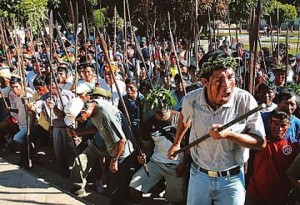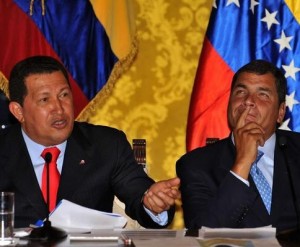Since March 23, 2005, in a commentary titled Ecuador’s Indigenous People Fight to Reclaim Ancestral Land, I’ve been commenting on the David v. Goliath quest by Amazonian Indians to get oil giant Chevron to pay for the damage its exploration for oil did to their rainforest.
 Here in part is how I framed the issue in that 2005 commentary:
Here in part is how I framed the issue in that 2005 commentary:
In the 1990s, Ecuador became the mecca for oil exploration in Latin America. The country’s Ministry of Energy and Mines sparked a black gold rush in 1999 when it confirmed Ecuador’s potential to yield as many as 26 billion barrels in oil reserves…
Notwithstanding foreign obligations and potential riches, however, the Indians have had enough! They have asserted ancestral land rights to areas of Ecuador where the potential yield for oil is greatest. And, to protect their rights and drive away the oil companies, they have organized guerilla campaigns of kidnappings, sabotages and robberies that would make the insurgents in Iraq green with envy…
They have staged city protests, filed legal injunctions and sued the companies for pollution, dumping waste into waterways and leaving behind hundreds of unlined pits brimming with toxic wastewater – which the Indians claim have caused irreparable harm to their health. In fact, a $6 billion class action lawsuit by Indian tribes have oil giant ChevronTexaco so tied up that the wariness of other oil companies is bringing oil production in Ecuador to a virtual standstill.
And here is what I predicted four years later when this David v. Goliath lawsuit finally made it to court:
I fully expect the Ecuadorian judge hearing this case to rule for the Indians against oil giant Chevron. Not least because of the substantive and demonstrable harm done to the rainforest, to say nothing of the unconscionable and irreparable harm done to the Indians (from oil pits that have contaminated the streams they rely on for drinking water).
(“Amazonian Indians Suing Chevron for Billions,” The iPINIONS Journal, May 5, 2009)
Well, I was right. The judge not only granted the Indians the $6 billion they sought but added $12 billion in punitive damages to reflect the egregious nature of Chevron’s conduct.
 Instead of paying up, however, Chevron began forum shopping to get a higher, more powerful court to affirm its imperious and specious view that this judgment was attained by “fraud and bias.” This led over the past three years, inexorably, to the U.S. Supreme Court. But it exposed just how utterly without merit Chevron’s appeal against enforcement of the $18 billion Ecuadorian judgment was when this U.S. Supreme Court ruled on Tuesday to not even dignify it with a hearing.
Instead of paying up, however, Chevron began forum shopping to get a higher, more powerful court to affirm its imperious and specious view that this judgment was attained by “fraud and bias.” This led over the past three years, inexorably, to the U.S. Supreme Court. But it exposed just how utterly without merit Chevron’s appeal against enforcement of the $18 billion Ecuadorian judgment was when this U.S. Supreme Court ruled on Tuesday to not even dignify it with a hearing.
Now Chevron will either pay or dare the mini-Chávez who now rules Ecuador, Rafael Correa, to nationalize its assets.
President Rafael Correa announced Saturday that he will enact a change to Ecuador’s hydrocarbons law allowing the government to nationalize oil fields if a private operator doesn’t comply with local laws.
(Associated Press, July 24, 2010)
No doubt the refusal of the U.S. Supreme Court to even hear Chevron’s appeal gives Correa the legal cover to do politically what he has been aching to do for years.
Meanwhile, it is worth noting that big oil companies have polluted and pillaged the land in Nigeria and other countries in Africajust as they have done in Ecuador and other countries in Latin America. Hope springs eternal, therefore, that, like the Amazonian Indians, African natives will win billions in compensation in due course.
But it is instructive that, where Ecuador had to chase after Chevron for two decades to get paid, it took the United States just two years to get BP to pay many billions more for mere collateral damage from its oil spill in the Gulf of Mexico in 2010.
Related commentaries:
Amazonian Indians suing…